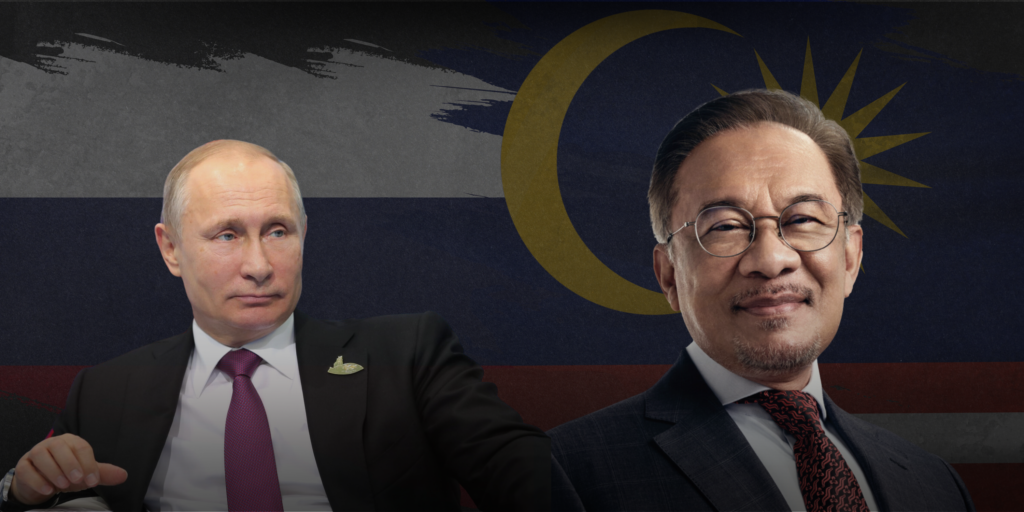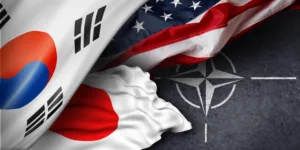The Malaysian leader’s apparent embrace of Russia reflects a growing cynicism about the current U.S.-backed global order.
Anwar Ibrahim can’t seem to stay away from Russia. The Malaysian prime minister, once the darling of Western claqueurs, visited Vladivostok last month for the Eastern Economic Forum, where he praised Vladimir Putin for his “vision and leadership” and for his “determination…to survive,” presumably against Western sanctions. Later this month, he’ll jet off to Kazan for a BRICS summit. What bon mots will he have saved for this visit?
Ian Storey recently suggested two reasons why Anwar is fawning over Moscow. The first is opportunism. Kuala Lumpur is desperate to join the BRICS group, so sucking up to Moscow, the club’s chairman, will secure its entrance. That’s not so convincing, though. Moscow had already offered its support for Malaysia’s inclusion before Anwar’s first visit to Russia, so why grovel at an open door? Moreover, no amount of lobbying will make Malaysia a member anytime soon. BRICS has stopped accepting new members for now. At best, Malaysia will soon be made a BRICS partner, the anteroom of full membership, as Storey put it. Until full membership is granted, Malaysia won’t enjoy the (albeit limited) benefits of the BRICS club.
Even if opportunism were the reason, it would hardly cast Anwar in a positive light, playing friendly with an imperialist, criminal government to get prospective membership of a club. Notice, however, how the opportunist epithet is thrown around too easily these days by those who seek to deflect blame from their supposed targets. “This politician doesn’t really believe what they’re saying; he has to do it for political reasons,” is the tale. Almost implicitly, the reader is supposed to give a knowing populist nod of atonement: “all politicians are opportunistic, so we cannot really blame him for doing that; anyone else would have done the same thing.”
There are genuinely venal politicians with no scruples, but they instinctively try to emerge in a better position on all fronts. Anwar hasn’t tried to do any balancing between Russia and the West for months. If BRICS membership was Anwar’s only motivation for visiting Russia twice in as many months, did he really need to commend Putin for his “vision and leadership” and for his “determination…to survive”? Did he have to praise Russia for its “remarkable soft power” that has earned it “global respect and admiration influencing the hearts and minds of people around the world”?
Anwar could have visited and voiced some platitudes but no praise. He could have said nothing of the Ukraine war, in fact. Did he need to preemptively spark regional squabbles over boycotts by saying that he is “looking forward” to Putin’s participation at the ASEAN Summit and East Asia Summit next year, which Malaysia will host? Why anger the section of the Malaysian public that still remembers it was Russian-backed separatists who shot down Malaysian Airlines flight MH17? Months earlier, he could have sent a senior official to the MH17 memorial in Amsterdam. The fact that he didn’t angered the Europeans, who were already aggrieved by Anwar’s lecturing about their apparent double standards on Gaza and Ukraine.
Indeed, the more likely reason is the second explanation Storey proposed: Anwar has become “cynical over the West’s harsh criticism of Russia but its muted response to Israel’s military actions in Gaza.” So cynical, in fact, that he felt visiting Russia and praising Putin would be a finger in the West’s eye. What, after all, was he referring to when he praised Putin’s “determination” to “survive”? Quite obviously, Western sanctions on Russia. While he found no time in Vladivostok to condemn Russia’s genocidal actions in Ukraine, he did use his platform there to call on the West to end Israel’s “ruthless genocidal campaigns” in Gaza.
One argument might be that because Anwar is so aggrieved by the West’s tolerance of Israel’s “genocide” in Gaza, he is willing to overlook Russia’s own colonialism and barbarism in Ukraine. On the surface, this would appear to be a contradiction, a case of Anwar falling into the same “double standards” and hypocrisy he’s quick to accuse others of. Yet, it would only be a contradiction if Anwar was opposed to colonialism or barbarism per se and opposed to all forms of it at the same time. However, it’s not that Anwar is so aggrieved by the West’s tolerance of alleged Israel that he is willing to overlook Russia’s own colonization and barbarism in Ukraine; it’s that he’s so aggrieved that he’s happy to condone Russian colonization and barbarism in Ukraine because the West opposes it.
One should not admonish Anwar too strongly for this; the world’s larger powers, including the United States, have a long history of the same solipsism. And it’s hardly fair to expect higher ethical standards from leaders of weaker nations. No, what Anwar deserves to be admonished for is trying to have it both ways. It would certainly not be a moral statement, but at least he could not have been accused of dishonesty if he was to say that he cares more about the suffering of Gazans than Ukrainians. Or, more accurately, that his anger at the West’s stance on Israel has compelled him to praise the West’s enemy.
The article was originally published by The Diplomat.







